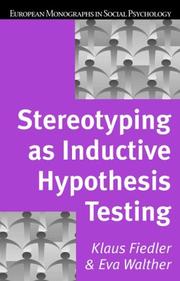| Listing 1 - 1 of 1 |
Sort by
|

ISBN: 0863778321 1135471053 1280077417 0203641531 9780203641538 9786610077410 661007741X 9780863778322 9781135471057 9781135471002 1135471002 9781135471040 1135471045 9781138883093 1138883093 9781280077418 Year: 2004 Publisher: Hove (UK) ; New York : Psychology Press,
Abstract | Keywords | Export | Availability | Bookmark
 Loading...
Loading...Choose an application
- Reference Manager
- EndNote
- RefWorks (Direct export to RefWorks)
Traditional social hypotheses have a built-in tendency to verify themselves and so involuntarily resist attempts at stereotype change or correction. This is the insight demonstrated and discussed as the start point for an alternative approach to the problem of stereotyping and hypothesis testing. Stereotyping as Inductive Hypothesis Testing explicates the proposition that many stereotypes originate not so much in individual brains, but in the stimulus environment that interacts with and constitutes the social individual. This cognitive-ecological approach is then used to analyse the different aspects of language, sign systems and communication that can implicitly govern hypothesis testing procedures and lead to circular or reinforcing outcomes. The authors describe factors in tests such as judgment, memory and expectation and go on to suggest viable ecological learning approaches to them. An original research project based on a classroom situation is used to demonstrate and verify findings. The cognitive-ecological approach is then contextualised in relation to both the traditional approaches it can replace and the contemporary statistical sampling practices it can improve. Written with a profound understanding of the link between theoretical rigour and good empirical research practice this monograph will be invaluable to anyone with an interest in stereotyping or who wishes to enhance the reliability and self-awareness of their research methods.
Stereotypes (Social psychology) --- Social sciences --- Stéréotypes --- Sciences sociales --- Research --- Methodology --- Methodology. --- Recherche --- Méthodologie --- Hypothesis. --- Assumption --- Supposition --- Logic --- Reasoning --- Science --- Mental stereotypes --- Stereotype (Psychology) --- Stereotyping (Social psychology) --- Social psychology --- Attitude (Psychology) --- Rigidity (Psychology)
| Listing 1 - 1 of 1 |
Sort by
|

 Search
Search Feedback
Feedback About UniCat
About UniCat  Help
Help News
News